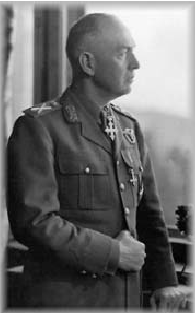Ion Antonescu

Ion Antonescu (Romanian pronunciation: [iˈon antoˈnesku] ( listen); June 15, 1882 – June 1, 1946) Romanian general and then marshall, leader of Axis-alligned Romania.
Quotes
[edit]- „I'm honoured that I could fight in four wars for your honour, my dear people, for your rights and your freedom.”
- „Be humane, be just and recognise that, over all ambitions, intrigues and hatred, there is the Motherland, the eternal of the people, and we always have to meet there, even though we disagree sometimes.”
- (letter adressed to Mihai Antonescu, 6 september 1941) „We must all understand that this is not a fight against Slavs, but against the Jews. It's a battle for life and death. Either we win and the world will purify, or they'll win and we'll become their slaves. Both the war in general and the battles at Odessa, especially, have made the proof that the Jew is Satan.[1]
- (transcripts from Council of Ministers meeting 13 noiembrie 1941) I. Antonescu: „I'd like you to remove all Jews from Odesa immediately, because the resistence at Sevastopol makes us think that we can expect a landing at Odesa. I thought Sevastopol will fall earlier. Yet today, because the Russian fleet has the possibility to use Sevastopol, it can make us an unpleasent surpirse.”
Gh. Alexianu (governor of Transnistria): „I gave them a term to finish everything and I'd please you to give me a boat..”
I. Antonescu: „To sank them.”
Gh. Alexianu: „To take them to Oceacov (Ochakiv).”
I. Antonescu: „You know, we lost a ship «Cavarna». My problem aren't the Jews, but the ship. [...] Regarding the Jews, how much will it take to solve the problem? How many Jews we have in Odesa?”
Gh. Alexianu: „About a hundred thousand. I decided to take them to the Navy barracks, but there I can't feed them and 10.000 don't fit, and if they go around the villages, they'll also contaminate the villages with typhus. I can take 10.000 to Alexandrovsca, and the rest at the shore of the Bug or maybe really take them beyond the Bug. But the Germans refuse to take them.”
I. Antonescu: „This subject should be adressed at Berlin. The Germans want to take all Jews from Europe to Russia and put them in a specified region. But before execution, there is time. What do we do with them for now? We wait for what Berlin decides? We're waiting for a subject which concerns us? We must put them to safety. Put them in the catacombs, put them in the Black Sea, but take them out of Odesa. I don't want to know anything. One hundred can die, one million can die, all can die...
- „The principle is that what is Romanian we'll put in Bucovina: what is foreign, Ukrainian, etc. we'll put in camps and from there dispatch them to the Slavic countries. (...) Gentlemen, you shall consider the need for this people to profit - in this desaster - to be puriefied, to be homogeneous. We're without mercy. I don't think at man; I think at the general interests of the Romanian people, who dictate for us to no longer be lenient as we were until now which resulted in our country being filled with so many neighbours who did for us the worst evil.”
Quotes about
[edit]- Far from disappearing after Corneliu Codreanu's execution (see Chapter 7), the Iron Guard had grown in power; indeed, after the overthrow of the monarchy, General Ion Antonescu had appointed Codreanu's successor, Horia Sima, as his Vice-Premier and proclaimed a 'National Legionary State'. As loyal allies, Romanian troops were also responsible for some of the worst anti-Semitic violence after the invasion of the Soviet Union, notably in Odessa. Some Hungarians also betrayed their Jewish neighbours, if only by denouncing them once the Germans had occupied their country.
- Niall Ferguson, The War of the World: Twentieth-Century Conflict and the Descent of the West (2006), p. 454
- Some already in power allied themselves with Hitler, including his chief ally, Benito Mussolini; Marshal Pétain (1856-1951; died in prison), the French premier who surrendered much of France to the Nazis; Pierre Laval (1883-1945; executed), former French prime minister who became leader of the Vichy government he helped the Germans establish; Marshal lon Antonescu (1882-1946; executed), the vehemently anti-Semitic and anti-Russian conducator of Romania, who forced King Carol II to abdicate, supported the Germans on the Eastern Front, and oversaw the murder of 380,000 Jews and 10,000 Gypsies; Boris III, tsar of Bulgaria (1894-1943; possibly poisoned), who agreed to deport 13,000 Jews from recently reannexed territories though protected those in Bulgaria; Admiral Miklós Horthy (1868-1957), Regent of Hungary who collaborated with the Nazis through fear of communism, but eventually broke with Hitler; and generals Georgios Tsolakoglou (1886-1948), Konstantinos Logothetopoulos (1878-1961) and Ioannis Rallis (4878-1946), Nazi puppets in Greece.
- Simon Sebag Montefiore, Monsters: History's Most Evil Men and Women (2009), pp. 258-259
- Of the Quislings, apart from Pavelic, the Romanian Antonescu, who ordered the frenzied massacres of Odessan and Romanian Jews, was Hitler’s most murderous ally: ‘The Jew,’ he said, ‘is Satan.’
- Simon Sebag Montefiore, Monsters: History's Most Evil Men and Women (2009), p. 259

